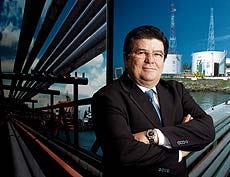 |
| Sergio Machado launches the first Promef Ship built in Rio de Janeiro |
Under the aegis of Sergio Machado, Transpetro launched a ship at the Mauá Shipyard. This was the first ship built in the state of Rio de Janeiro for the Program for Modernization and Expansion of the Fleet (Promef). The launch was attended by Governor Sérgio Cabral, the Transport Minister Paulo Sergio Passos, the acting president of Petrobras, Grace Foster, and the president of Transpetro,Sergio Machado. The event marked the revamp of shipbuilding industry in the country as one of the economic vocations.
At a news conference on the roof of Windsor Guanabara Hotel, Center of Rio de Janeiro, the president of Transpetro, Jose Sergio de Oliveira Machado, said the ship would carry the name ‘Celso Furtado’, named after the economist who created the SUDENE and released the latest industrial development cycle of the country. It is a vessel for the transportation of light oil products with a capacity of 48,300 dwt and 183 meters long.
The state of Rio, largest and most traditional naval hub of the country, already has 16 vessels ordered by Promef, with R $ 2.25 billion in investments. The program will create at least 50,000 jobs in the state, 10 thousand direct and 40 thousand indirect jobs.
The state of Rio, largest and most traditional naval hub of the country, already has 16 vessels ordered by Promef, with R $ 2.25 billion in investments. The program will create at least 50,000 jobs in the state, 10 thousand direct and 40 thousand indirect jobs.
The Mauá Shipyard which will build four Promef product tankers, is located in Ponta D'Areia, in Niterói, the region where the Brazilian shipbuilding industry started in the nineteenth century at the hands of the Baron of Mauá. President Sergio Machado at the ceremony said that a circle was completed. He said that the restructuring of Brazilian Naval Industry was initiated at the same spot from where the industry began.
The ship Celso Furtado is the first commissioned to a Rio de Janeiro shipyard by Petrobras to be thrown overboard, 23 years after the last order. The latter had been the Livramento, completed in 1997 by Eisa Shipyard. The vessel took 10 years to complete, amid a severe industry crisis. A Brazilian naval industry, which had been the world’s second largest manufacturer in the 1970s, virtually disappeared from radar from the 1980s.
The ship Celso Furtado is the first commissioned to a Rio de Janeiro shipyard by Petrobras to be thrown overboard, 23 years after the last order. The latter had been the Livramento, completed in 1997 by Eisa Shipyard. The vessel took 10 years to complete, amid a severe industry crisis. A Brazilian naval industry, which had been the world’s second largest manufacturer in the 1970s, virtually disappeared from radar from the 1980s.
No comments:
Post a Comment